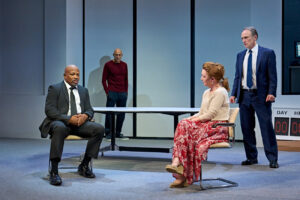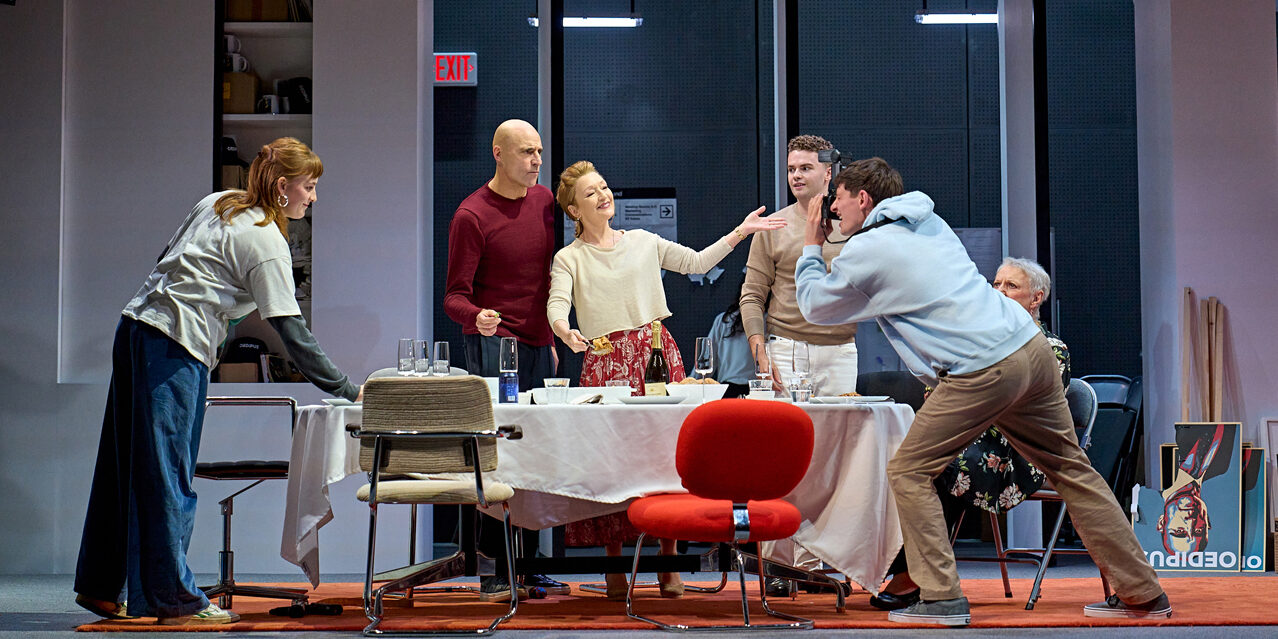Robert Icke’s Oedipus is set in a modern political world. Election campaigns are fought with highly polished videos put out by PR teams and public favour is gained by sincerity and self-disclosure. An assured and muscular Mark Strong is Oedipus, touted as a refreshing anodyne to the lies and corruption of previous administrations. His strong sense of self-knowledge and professional commitment is alluring to voters who have been fobbed off with hypocrisy and feckless governance. That he’ll win the election, as everyone keeps telling him, is a sure bet. So where does it all go wrong?
Oedipus’ hubris (fatal pride or arrogance) is masterfully foregrounded by Icke. In the promotional election video that serves as a prologue to the play, Oedipus confidently pledges to reopen the investigation into the death of his political predecessor and older wife’s ex-husband, Laius, and publish his own widely contested birth certificate. This cleverly amalgamates a number of political news stories from recent years: the questioning of Obama’s eligibility to be president; the twenty-four-year age-gap of the Macrons; David Cameron’s misplaced assurance about the outcome of the Brexit referendum. Icke’s Thebes is not safely ancient and historicised, but close enough to make you wince.
Fate also has its part to play. Icke depends on the audience knowing where the tragedy is headed—revelations of mother-son incest, gouged out eyes, self-slaughter—and tantalisingly teases this out in the dramatic irony of the dialogue. At the celebratory election night dinner, Jocasta (a magnetic Lesley Manville) says she often tells people that she has three sons, her husband included; and Oedipus gives one of his sons a talk on the importance of accepting different forms of love. These ironies might seem a little heavy-handed, but they successfully heighten tension by keeping the tragic end firmly in sight.

So too does Icke’s signature digital clock on the stage—also employed in his productions of Romeo and Juliet (2012) and Oresteia (2015). Here it returns with unsettling force, conjuring the feeling of an impending explosion. Since many theatregoers know Sophocles’ story, it also evokes a desire to jump ahead to the moment of Oedipus’ painful self-revelation, where all riddles are resolved and cathartic relief is finally offered. Until then, the plot unfolds in a torturously piecemeal way; this is reflected in Hildegard Bechtler’s set—a campaign HQ that doubles as a place for family gatherings—which is gradually dismantled as the play runs its course.
Underpinning all the action is Strong and Manville’s explosive sexual chemistry. Jocasta and Oedipus are barely able to keep their hands off each other, performing sexual acts on stage and sneaking off for further lovemaking. Even when the incestuous nature of their relationship is made apparent, the mother-son couple can’t help but entwine in an achingly desperate embrace, which sound designer Tom Gibson sets poignantly (and profanely) to bellowing choral music. We’re never left in doubt of the nature of their love: abominable in the eyes of society, but heartbreakingly pure in feeling.
Disarming sympathy is the keynote throughout. Icke’s Jocasta isn’t a depraved widow but a victim of paedophilia, whose previous marriage was based on insidious abuse and control. Manville’s telling of this backstory is one of the most affecting moments in the play, showing the fragility behind her vivacious veneer. Similarly, Oedipus’ irresponsible killing of Laius and cowardly fleeing of the scene seems almost excusable because of the latter’s repulsive character.
What Robert Icke’s production misses in the poetry of Sophocles’ language, it finds in its deft characterisations. Here are no well-worn literary archetypes or figures that lay the template for Freudian psychoanalytical studies, but human beings burningly alive and breathing.
Greek Tragedy
Written and director: Robert Icke
Photo credits: Manuel Harlan
Cast includes: Mark Strong; Lesley Manville; Samuel Brewer; Michael Gould; Phia Saban; June Watson; Jordan Scowen; James Wilbraham.
Until: Saturday 4th January 2025
Running Time: 2 hours with no interval
Photo credit: -Manuel Harlan

